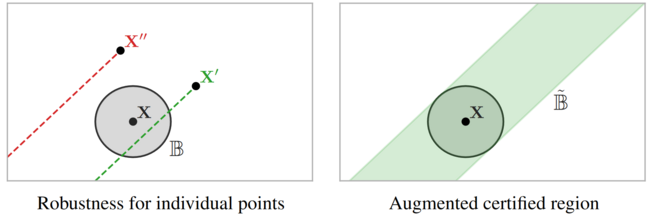This is the official reference implementation of
"Invariance-Aware Randomized Smoothing Certificates"
Jan Schuchardt, and Stephan Günnemann, NeurIPS 2022.
Our main requirements are numpy, torch, torchvision and the "Slurm Experiment Management Library (SEML)".
To install the requirements, execute
conda env create -f requirements.yaml
You also need to download reference implementations for different point cloud classifiers we use in our experiments,
which can be found in the reference implementations subfolder.
git submodule init
git submodule update
You can install this package via pip install .
To reproduce our experiments, you need two datasets: MNIST and the ModelNet40 point cloud dataset.
MNIST can be installed via torchvision:
from torchvision.datasets import MNIST
mnist_dir = 'your_folder_here'
MNIST('./data', train=True, download=True)
MNIST('./data', train=False, download=True)
For the ModelNet40 dataset, download the original and pre-processed files linked in the Pointnet_Pointnet2_pytorch repository.
In the demos subfolder, you can find two notebooks that explain and recreate the four different types of experiments from our paper.
In order to reproduce all experiments, you will need need to execute the scripts in seml/scripts using the config files provided
in seml/configs.
There are four different scripts:
- train.py: Used for training the base classifiers for randomized smoothing
- sample_votes.py: Used for randomly sampling predictions from a base classifier under the smoothing distribution
- eval_forward.py: Used for evaluating the certificates, i.e. how robust predictions are under a specific form of perturbation
- eval_inverse.py: Used for evaluating the inverse certificates, i.e. the minimum clean prediction probability required for certifying robustness (does not require training or sampling).
After that, you can use the notebooks in plotting to recreate the figures from the paper.
For more details on which config files and plotting notebooks to use for recreating which figure from the paper, please consult REPRODUCE.MD
This repository includes code from Pointnet_Pointnet2_pytorch, DGCNN and Rotation-invariant-deep-pointcloud-analysis, which are made available under MIT license.
Please cite our paper if you use this code in your own work:
@InProceedings{Schuchardt2022_Invariance,
author = {Schuchardt, Jan and G{\"u}nnemann, Stephan},
title = {Invariance-Aware Randomized Smoothing Certificates},
booktitle = {Conference on Neural Information Processing Systems (NeurIPS)},
year = {2022},
}
